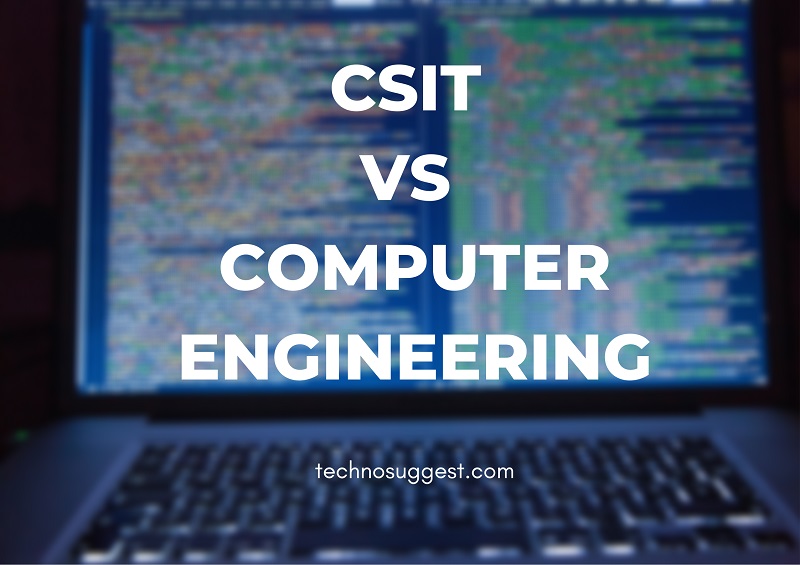Computer Science and Information Technology (CSIT) and Computer Engineering are sometimes used interchangeably since they both deal with the study of computers, their design, and application. In today’s world, both disciplines are vital. In fact, they complement each other. Although CSIT and computer engineering have a lot in common, the two variables have some significant differences that have been emphasized by authors and researchers in this field and in the context of this article. The goal of this essay is to extensively provide a thorough discussion on the differences and similarities that exist between CSIT vs computer engineering programs in any institution. We provide answers to these and other questions in this article, and in conclusion, all the information needed to decide whether a degree in Computer Engineering or Computer Science and Information Technology is right will be discussed. At this point, it’s pertinent to first examine the concepts of CSIT and computer engineering variables.
From the topic of CSIT vs Computer Engineering, what is CSIT exactly?
CSIT is generally known to be primarily concerned with networking, programming, and data mining, all of which are crucial in computer science.
However, algorithms, languages, hardware architectures, systems software, applications software, and tools are the primary concerns of computer scientists all over the world. Therefore, the capacity to solve problems and think independently is stressed in the computer science and information technology program, hence, data structures, computer architecture, software design, algorithms, programming languages, and object-oriented are core component subjects in CSIT. Upon completion of the CSIT study, individuals can be able to design technical solutions to address the trending problems regarding software and software. The CSIT program builds up the critical and analytical skills essential for all computer professionals in the profession.
CSIT in its wider scope doesn’t only concern itself with molding capable and innovative information Technology skilled manpower but it also lays emphasis on those who seek to develop themselves as an entrepreneur. That is, with the new techniques, creativity, proper research, and documentation in CSIT, students will be able to grow and build their carrier as skillful entrepreneurs.
What exactly is Computer Engineering?
Computer engineering generally known as a department of electrical engineering, integrates numerous fields of computer technology and digital engineering required to expand computer hardware and software programs. This is a discipline that draws its interest from the study of computer hardware. Interestingly, Computer Engineering makes use of concepts from Computer Science and Electrical Engineering to create hardware (bodily components) and firmware, which have been utilized by many companies in various sectors for consumer electronics, scientific gadgets, self-using motors, communiqué structures, aircraft, etc. Elaborately, studying Computer Engineering helps college students discover ways to expand, prototype, and test microchips, circuits, processors, conductors, and other segments utilized in computer gadgets or structures (e.g., supercomputers, smartphones, laptops, servers, and gadgets).
They additionally expand firmware, which is a vital form of software program that allows in-running structures and programs to take complete benefit of the hardware. One cannot study computer engineering without the use of mathematics, statistics, and physics. Hence, the role of computer engineering is bright. In our contemporary world, increasingly digital computer gadget inventions and innovations have emerged and are being embedded in everyday life, and the relevance for computer engineers will keep rising. The speedy growth and development of technology in the aspect of the Internet of Things (IoT) gadgets, for example, can significantly show how important and relevant computer engineering is in today’s world.
CSIT vs Computer Engineering
CSIT is a software program-orientated route embedded with particular topics like Cognitive Science, Artificial Intelligence, E-governance, and Web Technologies. In addition, it lays extra focus on programming, networking, and data mining. Based on the characteristics of the CSIT discipline, CSIT records a greater activity-orientated subject, as it offers individuals additional freedom to focus on any discipline of computer technology they need, for instance, programming, networking, virtual marketing, photo and graphic design, and so on.
Whereas, in computer engineering, being a subset of engineering, one ought to have extensive knowledge as well as competence in physics, chemistry, a whole lot of mathematics, statistics, economics, electronics, thermodynamics, electrical engineering drawing subjects, etc. It’s important to note that the former is more practical and oriented, while the latter is theoretically oriented, which makes the former very expensive. However, computer engineering’s being considered to be the center department of computer systems, according to some authors, has to do with studying programming languages and computer networking, which gives room for deep information on almost all aspects of computer systems. It also entails deep-seated computer languages like binary codes and ideas associated with each hardware and software program.

These are the main areas presented to students by colleges and universities with computer engineering programs. Interestingly, people have a tendency to study or offer computer engineering simply so they can be called “an engineer” after the crowning glory of their degrees. That’s a bonus, despite the fact that it doesn’t certainly matter. It’s worthy of notice that many nations in the world make big investments and more assets into computer engineering vs CSIT programs. For instance, a great number of government scholarships online are offered in computer engineering programs vs CSIT programs.
Graduating with a diploma or degree in computer engineering opens various doorways to college students that can work hard to expand/ increase or manufacture aerospace, automotive, scientific and telecommunications structures, and devices and so on. Students can also expand computer structure structures and equipment, such as circuit boards, routers, and sensors. Computer engineering graduates have sufficient education to land jobs in these areas.

CSIT students are at an advantage when it comes to information and expertise in computer technology, and they can concentrate on computer application programming, in addition to automation roles. However, they can also expand community structures, databases, and websites. Every company desires the abilities of computer technological know-how graduates to employ due to the fact that most companies nowadays have software program products, apps, and websites, so there aren’t limited to what CSIT graduates can do.
It’s very easy for graduates of CSIT to get jobs in a variety of governmental, non-governmental, private, and public entities, including telecommunication sectors, because they are regarded as specialists who could be employed in computer networking companies as software developers, network administrators, web developers, database administrators, IT managers/officers, cryptographers, system analysts, project managers, document specialists, information system auditors, artificial intelligence specialists, technical writers, information system managers, database operators, GIS operators, among others. Students who major in or offer a CSIT program are usually taught, mentored, and coached by top-notch professors and lecturers in deepening their theoretical foundation in computer science while also developing problem-solving abilities through hands-on information technology experience. This is because learning CSIT requires professionals in the field due to the scope and nature of the discipline.
In terms of work specifications and specialty, computer engineers literally build hardware while computer scientists generally do not. However, computer scientists are certainly vested with the required knowledge about hardware to be able to completely analyze computer system operations and interact with hardware engineers around them. Excitingly, computer scientists basically know pretty much more about the underlying theory of computation, programming languages, and operating systems.
In context of learning materials
In the context of learning materials, students in the computer science department who study CSIT learn how to effectively and completely build computer systems, and ways to completely solve problems on computers, including finding solutions to other electronic technologies using data storage and processing in a very unique way. CSIT students embrace the wide range of opportunities to learn a variety of computer languages and computing environments that helps them master a range of skills from creating computer graphics, through developing and analyzing numerical and statistical algorithms, including building and storing databases, operating systems, very complex computer networks, and improving human-computer interactions in a subtle manner.
Whereas computer engineering students, on the other hand, particularly are somewhere in the middle of computer science and electrical engineering, contrary to popular perceptions. That, in essence, is responsible for the inclusion of system operations and computer architecture courses in a computer engineering degree program. However, the focus of computer engineering is mainly channeled into the core prototyping, development, and design of both software and hardware, as well as the integration of the two in a subtle manner. Consequently, higher institutions offering computer engineering courses assign a deep interest in integrated circuits, physics, and inventions of basically physical devices, which facilitates learning and mastery of robotics, pattern recognition, speech processing, and much more by computer engineering students.
CONCLUSION
Whichever discipline among the two discussed in this work an individual chooses to study, it’s his or her main goal is to decide whether to become a software developer or work in tech-related jobs like website development, graphic designing, digital marketing, A1 or machine learning, programming, or starting some tech-related startups.
From the points highlighted above, it can be noted that both CSIT and Computer Engineering are relevant disciplines in the field of computers and ICT, and one can choose to study either of the two and become great. It all depends on what an individual wants to become or specialize in.
Interestingly, both CSIT and Computer Engineering degree holders can fit into the following specialized fields of employment: Science, technology, engineering, industry, computers, and exploration companies. Whichever path one may take as regards the components of this article, the final destination can be reached from either CSIT or Computer Engineering, which one may decide to pursue.
